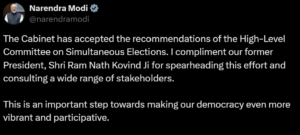In a landmark decision, the Union Cabinet, led by Prime Minister Narendra Modi, has embraced the ‘One Nation, One Election’ vision, greenlighting the recommendations from a high-level committee led by former President Ram Nath Kovind. This initiative, aiming for synchronized national, state, and local elections, marks a pivotal shift in India’s electoral framework, seeking to streamline governance and reduce the financial and administrative burden of frequent polls.
Key Recommendations Accepted:
-
Dual-Phase Implementation: Initially, elections for the Lok Sabha and state assemblies will be held simultaneously. This will be followed by local body elections (panchayats and municipalities) within 100 days of the general elections.
-
Common Electoral Roll: The proposal includes creating a unified voter list for all elections to enhance efficiency and reduce discrepancies.
-
Broad Consensus: Despite political diversities, the report indicates widespread support for this electoral reform, following extensive consultations across the political spectrum.
-
Implementation Group: A dedicated group will oversee the transition to this new electoral model, ensuring its seamless execution.
Implications:
-
Legal and Constitutional Hurdles: The initiative necessitates amendments to Articles 83 and 172 of the Constitution, dealing with the duration of the Lok Sabha and state assemblies, respectively. This legislative amendment process could face opposition, considering the need for a broad political consensus.
-
Potential Challenges: The logistical coordination for simultaneous polls, especially in a vast and diverse country like India, presents significant challenges. Moreover, the immediate dissolution of several state assemblies before their term to align with the new schedule might stir political unrest.
 Prime Minister Narendra Modi’s Statement: The Cabinet has accepted the recommendations of the High-Level Committee on Simultaneous Elections. I compliment our former President, Shri Ram Nath Kovind Ji, for spearheading this effort and consulting a wide range of stakeholders. This is an important step towards making our democracy even more vibrant and participative.
Prime Minister Narendra Modi’s Statement: The Cabinet has accepted the recommendations of the High-Level Committee on Simultaneous Elections. I compliment our former President, Shri Ram Nath Kovind Ji, for spearheading this effort and consulting a wide range of stakeholders. This is an important step towards making our democracy even more vibrant and participative.https://twitter.com/narendramodi/status/1836389490388087122
This monumental decision by the Modi-led cabinet, if realized, promises a transformative approach to electoral politics in India. While it aims for governance efficiency, the journey towards ‘One Nation, One Election’ by 2029 will undoubtedly navigate through intricate legal, logistical, and political landscapes, with the opposition and legal luminaries poised to scrutinize each step for its implications on democracy and federalism.



